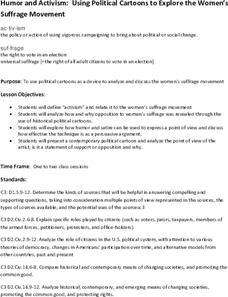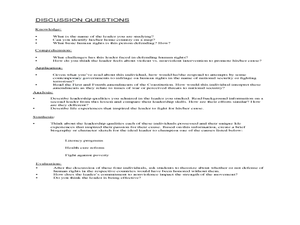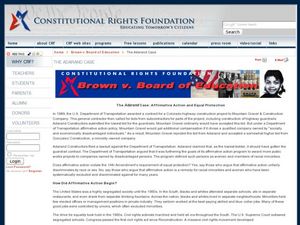James Madison Memorial Fellowship Foundation
Those "Other Rights:" The Constitution and Slavery
Did the United States Constitution uphold the institution of slavery, or did it help to destroy it? Young historians study Article 4, Section 2, Clause 3 of the Constitution and evaluate the rights of slaveowners as they compared to or...
Curated OER
Bill of Rights
US history classes explore constitutional rights as they relate to court cases involving teens. Your class must already be familiar with the Bill of Rights before beginning this series of exercises. In preparation for a debate-style...
Center for History and New Media
A Look at Virginians During Reconstruction, 1865-1877
The transition between rebellion to reunification was not smooth after the Civil War. Young historians compare primary and secondary source documents in a study of the Reconstruction era in Virginia, noting the rights that were not...
Curated OER
Race and Voting in the Segregated South
Students examine the history of African American voting rights. In this voting rights instructional activity, students listen to a lecture on African American voting rights between the years 1890 and 1965. Students respond to discussion...
Curated OER
Latinos and the Fourteenth Amendment: A Primary Source Document Activity
Eighth graders explore the effect of the Fourteenth Amendment. For this US History lesson, 8th graders read and analyze primary source documents. Students write a three minute paper demonstrating their understanding of the fourteenth...
Curated OER
Equal Protection Questions
In this Supreme Court worksheet, students respond to 14 short answer questions regarding equal protection and gay marriage issues in the United States.
Curated OER
Civil Rights: An Investigation
High schoolers take a closer look at the political side of the American Civil Rights Movement. In this 20th century American history instructional activity, students research the contributions of President Johnson, Dr. Martin Luther...
National Woman's History Museum
The Power of Words and Activism: Susan B. Anthony
Where have all the activists gone? Class members compare 21st-century activism with the suffrage movement and the work of Susan B. Anthony. They begin by examining Anthony's biography and speeches to find evidence that her words and...
National Woman's History Museum
Women's Suffrage Movement
The National Women's History Museum offers a 20-slide presentation that details the history of the Women's Suffrage Movement from its creation in the 1830s through the passage of the Nineteenth Amendment in 1920.
National Woman's History Museum
Humor and Activism
As part of their study of the women's suffrage movement, groups analyze political cartoons and drawings. They create a caption for an image from the time, add an exhibit label that provides a context for their drawing, and post as part...
National Woman's History Museum
The National Woman’s Party
Two parties led the women's suffrage movement. The National American Woman Suffrage Association (NAWSA) was a moderate organization while the National Women's Party (NWP) was more militant. Young historians investigate why members of the...
Curated OER
Separate But Equal Video
Eighth graders watch the video "Separate But Equal." They choose an incident or event from the video that is interesting or meaningful to them and write an objective news article and an editorial.
Curated OER
Human Rights Defenders Scavenger Hunt: A Computer Lab Activity
Students explore human rights issues. In this human rights lesson, students use the Carter Center Human Rights Defenders website to complete a scavenger hunt that allows them to investigate the work of those fighting for human rights...
Curated OER
Significance of Individuals to Defending Human Rights
Eleventh graders examine four different kinds of human rights. In this American Government lesson, 11th graders research the assigned human right in their groups. Students create a presentation about this human right to their classmates.
Curated OER
Who’s Got Rights? An Introduction to Human Rights and Human Rights Defenders
Students explore human rights issues. In this social justice lesson, students examine human rights as they read segments of the "Universal Declaration of Human Rights," discuss photographs with human rights implications, and play a human...
Curated OER
Worksheet #50 Questions - Amendments
In this historical quiz worksheet, students test their knowledge on multiple historical references that relate to the Bill of Rights and the Constitution. Students answer ten fill in the blank questions.
Curated OER
Bill of Rights: Rights and Responsibilities
Students explore the Bill of Rights. For this U.S. Constitution lesson, students consider the individual liberties outlined in the Bill of Rights as they read the provided handouts and complete the provided worksheet activities.
Curated OER
In the Courts
High schoolers explore desegregation in the courts. In this civil rights activity, students listen to their instructor present a lecture on Supreme Court cases Brown v. Board of Education and Plessy v. Ferguson. High schoolers examine...
Curated OER
U.S. History Worksheet #73
Explore how the 14th Amendment changed the way the United States operated, both politicallay and socially. In this United States history activity, students utilize a word bank of 10 terms or phrases to answer 10 fill in the blank...
Curated OER
The Adarand Case: Affirmative Action and Equal Protection
Eleventh graders examine the Adarand case. In this American Government lesson plan, 11th graders create a list of reasons for each affirmative action program. Students develop a defense on certain issues and present it to the class.
Curated OER
The Ongoing Debate: Crime Control v. Due Process Protection
Learners investigate the Exclusionary Rule and other ways of to enforce the protections found in the Bill of Rights. They study how effective criminal control and public safety is carried out while citizens Constitutional rights are...
DocsTeach
School Desegregation Court Cases: Mendez v. Westminster and Brown v. Board
Separate is not equal! Young historians analyze the petition from the U.S. Supreme Court case Mendez v. Westminster filed in 1945 and examine background material about the case. They then compare it to the more famous Brown v. Board of...
Curated OER
Bill of Rights: Rights and Responsibilities
Students explore the meaning of freedom. In this U.S. History lesson, students research the Declaration of Independence and how it relates to American freedom by completing activities and a mock trial.
US House of Representatives
“The Fifteenth Amendment in Flesh and Blood,” The Symbolic Generation of Black Americans in Congress, 1870–1887
The reading of a contextual essay launches a study of Black Americans who served in Congress from 1870 through 1887. Young historians identify the African Americans who served during this period, investigate the ways they won national...

























